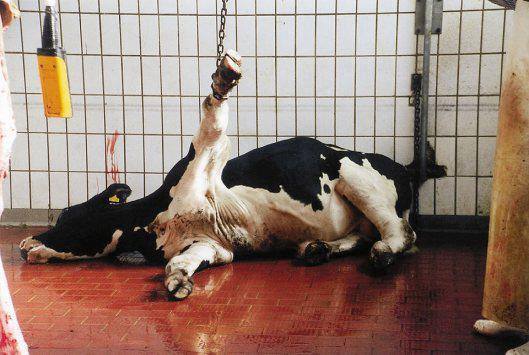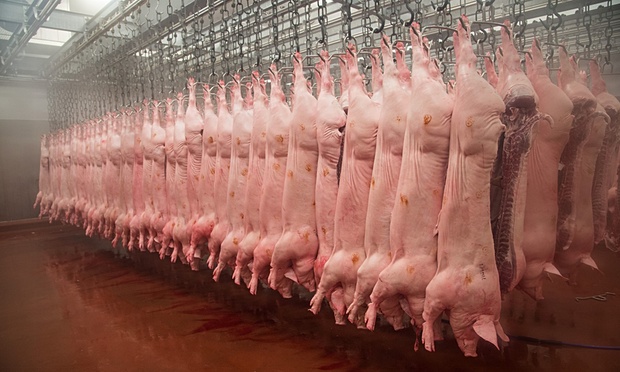In the interest of full disclosure, I’m not a Christian, or even a believer in God, but I am nevertheless interested in religion, and think that a compelling Christian case for veganism can be made.
First, it’s important to consider that, although God gives humans permission to start eating animals after the rebellion and fall of man, He never mandates it. In other words, as a Christian, you’re under no compulsion or obligation to continue participating in and supporting unnecessary violence against pigs, chickens or cows, and are free to make what many notable Christian thinkers, from St. Basil to John Wesley to Leo Tolstoy, have regarded as a more compassionate and respectful choice, as well as one that is more consistent with God’s perfect vision of creation and Christ’s teachings on non-violence.
It’s also important to recognise that the Biblical passages which give humans permission  to eat animals were written at a specific moment in time, within a specific cultural and moral context, and for a specific audience, with a specific intent, and are not necessarily applicable to 21st century life. Modern, commercial animal agriculture bears little resemblance to the sort of systems that existed thousands of years ago. Today, we inflict suffering and death on animals on an unprecedented scale, and cause an unprecedented amount of environmental destruction in the process. In a single year, we rear, transport and slaughter around 60 billion mammals and birds, and kill an additional 2.7 trillion sea animals.
to eat animals were written at a specific moment in time, within a specific cultural and moral context, and for a specific audience, with a specific intent, and are not necessarily applicable to 21st century life. Modern, commercial animal agriculture bears little resemblance to the sort of systems that existed thousands of years ago. Today, we inflict suffering and death on animals on an unprecedented scale, and cause an unprecedented amount of environmental destruction in the process. In a single year, we rear, transport and slaughter around 60 billion mammals and birds, and kill an additional 2.7 trillion sea animals.
The description of the Garden of Eden in Genesis gives us an insight into God’s vision of perfection, and makes it clear that He prefers a world in which humans do not kill and eat other animals:
“Then God said, “I give you every seed-bearing plant on the face of the whole earth and every tree that has fruit with seed in it. They will be yours for food. And to all the beasts of the earth and all the birds in the sky and all the creatures that move along the ground – everything that has the breath of life in it – I give every green plant for food.” (Genesis 1:29-30)
The description of the eternal Kingdom of God in Isaiah also offers an insight in His ideals and conception of perfection, and echoes the view expressed in Genesis:
“The wolf will live with the lamb, the leopard will lie down with the goat, the calf and the lion and the yearling together. The cow will feed with the bear, their young will lie down together, and the lion will eat straw like the ox. The infant will play near the cobra’s den, the young child will put its hand into the viper’s nest. They will neither harm nor destroy on my holy mountain.” (Isaiah 11: 6-9)
 We should also consider that most people have a strong, intuitive aversion to harming animals. There is a reason that parents take their children to pick apples, but not to slaughter lambs or pigs. The thought of using force and violence against a lamb, such as by beating them over the head, hanging them upside down and then cutting their throat, probably horrifies you. This adds even more weight to the idea that doing so is contrary to God’s will and intention for humankind. As He states in Jeremiah 31:33, “I will put my law in their minds and write in on their hearts.”
We should also consider that most people have a strong, intuitive aversion to harming animals. There is a reason that parents take their children to pick apples, but not to slaughter lambs or pigs. The thought of using force and violence against a lamb, such as by beating them over the head, hanging them upside down and then cutting their throat, probably horrifies you. This adds even more weight to the idea that doing so is contrary to God’s will and intention for humankind. As He states in Jeremiah 31:33, “I will put my law in their minds and write in on their hearts.”
Christians often ask themselves, “What would Jesus do?”, but I’m not convinced that Christ – the “prince of peace” (Isaiah 9:6), whose commitment to non-violence was so strong that He instructed people to love their enemies (Matthew 5:44), and turn the other cheek (Luke 6:29) – could stand in a modern slaughterhouse, surrounded by hot, blood-choked air and the frantic bellows of fearful creatures, and watch with indifference as, one by one, they are electrocuted, gassed, shot or stabbed, and for no better reason than taste. I am not convinced that the person who  declared “blessed are the peacemakers”, (Matthew 5:9) would participate in, say, the practice of tossing day-old male chicks into grinders because they are unable to lay eggs – a practice that is inherent to both factory and free-range egg farming. So, if you believe that you should “let the peace of Christ rule in your heart” (Colossians 3:15), and “make every effort to do what leads to peace” (Romans 14:19), then you should go vegan.
declared “blessed are the peacemakers”, (Matthew 5:9) would participate in, say, the practice of tossing day-old male chicks into grinders because they are unable to lay eggs – a practice that is inherent to both factory and free-range egg farming. So, if you believe that you should “let the peace of Christ rule in your heart” (Colossians 3:15), and “make every effort to do what leads to peace” (Romans 14:19), then you should go vegan.
2. Non-violence to the planet
If you take the idea of stewardship seriously, and believe that humans are responsible for the planet, and should take care of it, then you should go vegan, because animal agriculture is an environmental disaster, and is killing the planet at a much faster rate than anything else. It is the leading cause of, among other things, climate change, water depletion, water pollution, ocean dead zones, deforestation and species extinction. It is not surprising that a recent UN report stated that “a global shift towards a vegan diet is vital to save the world from hunger, fuel poverty and the worst impacts of climate change”, given that a person who follows a vegan diet produces the equivalent of 50% less carbon dioxide than an average meat, dairy and egg-eater, and uses 1/11th of the oil, 1/13th of the water, and 1/18th of the land. To quote Demosthenes Maratos of The Sustainability Institute, “no other lifestyle choice has a further reaching or more profoundly positive impact on the planet and all life on earth than choosing to stop consuming animals.” If we are, as Leviticus 25:23 states, “but aliens and tenants” of God’s land, then we have a moral obligation to not participate in its destruction, because it is not ours to destroy. As Psalm 24:1 makes perfectly clear, “the earth is the Lord’s, and everything in it, the world, and all who live in it.”
towards a vegan diet is vital to save the world from hunger, fuel poverty and the worst impacts of climate change”, given that a person who follows a vegan diet produces the equivalent of 50% less carbon dioxide than an average meat, dairy and egg-eater, and uses 1/11th of the oil, 1/13th of the water, and 1/18th of the land. To quote Demosthenes Maratos of The Sustainability Institute, “no other lifestyle choice has a further reaching or more profoundly positive impact on the planet and all life on earth than choosing to stop consuming animals.” If we are, as Leviticus 25:23 states, “but aliens and tenants” of God’s land, then we have a moral obligation to not participate in its destruction, because it is not ours to destroy. As Psalm 24:1 makes perfectly clear, “the earth is the Lord’s, and everything in it, the world, and all who live in it.”
Moreover, we are failing in our moral duties not only towards the planet itself, but towards its human and non-human inhabitants, who will suffer the consequences of our environmental devastation, which may include, among other things, hurricanes, floods, droughts, famine, mass migration, global economic meltdown, water wars and societal collapse. If you are still unsure, then consider Paul’s almost prophetic injunction in Romans 14:20-23: “Do not destroy the work of God for the sake of food. All food is clean, but it is wrong for a man to eat anything that causes someone else to stumble. It is better not to eat meat or drink wine or to do anything else that will cause your brother to fall.”
3. Non-violence to ourselves
If you take seriously the idea, as articulated in 1 Corinthians 6:19, that “your bodies are temples of the Holy Spirit”, and that you must “therefore honour God with your bodies”, then you should go vegan for this reason too, because scientific research has confirmed that consuming meat, dairy and eggs, even in moderation, is harmful to our bodies, and that a healthy, balanced vegan diet can, according to the United States’ oldest, largest, and foremost authority on diet and nutrition, the American Academy of Nutrition & Dietetics, confer significant health benefits, such as reduction in incidence of obesity, diabetes, high blood pressure, cholesterol, heart attack, stroke, and some types of cancer. Although I did not became a vegan for health reasons, I can tell you that I have never felt healthier in my entire life. The WHO report.




 s too. The sexist belief that the most important interests of women, such as in bodily autonomy, may be sacrificed in order to promote the most trivial interests of men, such as in experiencing momentary sexual pleasure, is intellectually and ethically indefensible, and the same is true of the speciesist belief that the most important interests of non-humans, such as in not suffering, and not being killed, may be sacrificed in order to promote the most trivial interests of humans, such as in experiencing momentary palate pleasure. I cannot oppose one form of arbitrary discrimination, oppression and exploitation, while supporting another three times a day, and seven days a week. To quote Gary Francione, “if you object to patriarchal oppression, then you are committed to objecting to speciesism.” Of course, the same is true of ableism, ageism, classism, heterosexism, r
s too. The sexist belief that the most important interests of women, such as in bodily autonomy, may be sacrificed in order to promote the most trivial interests of men, such as in experiencing momentary sexual pleasure, is intellectually and ethically indefensible, and the same is true of the speciesist belief that the most important interests of non-humans, such as in not suffering, and not being killed, may be sacrificed in order to promote the most trivial interests of humans, such as in experiencing momentary palate pleasure. I cannot oppose one form of arbitrary discrimination, oppression and exploitation, while supporting another three times a day, and seven days a week. To quote Gary Francione, “if you object to patriarchal oppression, then you are committed to objecting to speciesism.” Of course, the same is true of ableism, ageism, classism, heterosexism, r acism, and any other form of arbitrary discrimination. It is also worth considering that, although non-humans of both sexes suffer from institutionalised exploitation within the meat, dairy and egg industries, the abuse of females is often more prolonged, and involves, among other things, being subjected to emotionally crushing experiences, such as forceful impregnation and separation from their children. The female reproductive system is regarded as nothing more than an economic resource, and these emotionally complex beings are reduced to baby and milk-producing machines. Consider, for example, the use and abuse of dairy cows. Contrary to popular belief, a female cow does not produce milk naturally, but does so for the same reason that a woman does, that is, in order to nourish her young. Hence, we forcefully impregnate her, which involves, among other
acism, and any other form of arbitrary discrimination. It is also worth considering that, although non-humans of both sexes suffer from institutionalised exploitation within the meat, dairy and egg industries, the abuse of females is often more prolonged, and involves, among other things, being subjected to emotionally crushing experiences, such as forceful impregnation and separation from their children. The female reproductive system is regarded as nothing more than an economic resource, and these emotionally complex beings are reduced to baby and milk-producing machines. Consider, for example, the use and abuse of dairy cows. Contrary to popular belief, a female cow does not produce milk naturally, but does so for the same reason that a woman does, that is, in order to nourish her young. Hence, we forcefully impregnate her, which involves, among other things, a worker forcing his arm into her rectum, and an insemination rod into her vagina. The apparatus that is used to restrain her during this invasive procedure is referred to within the industry as a “rape rack”. After her forceful impregnation, she endures a tough pregnancy, which culminates in a painful birth. Her calf is taken from her almost immediately, which is a traumatic experience for both of them, who often resist and protest this separation. Day after day, they cry out for one another, but they will never see each other again, because we want her milk all to ourselves. If the calf is a boy, then he is either sent to a veal farm, or slaughtered when he is a few days old, and turned into cheap beef, because he is of
things, a worker forcing his arm into her rectum, and an insemination rod into her vagina. The apparatus that is used to restrain her during this invasive procedure is referred to within the industry as a “rape rack”. After her forceful impregnation, she endures a tough pregnancy, which culminates in a painful birth. Her calf is taken from her almost immediately, which is a traumatic experience for both of them, who often resist and protest this separation. Day after day, they cry out for one another, but they will never see each other again, because we want her milk all to ourselves. If the calf is a boy, then he is either sent to a veal farm, or slaughtered when he is a few days old, and turned into cheap beef, because he is of  no use to the industry. If the calf is a girl, then she is condemned to the same fate as her mother. If she was not separated from her calf, then he or she would feed around five or six times a day, which would mean that the maximum amount of milk that she would carry in her udder would be around two liters. However, she has been
no use to the industry. If the calf is a girl, then she is condemned to the same fate as her mother. If she was not separated from her calf, then he or she would feed around five or six times a day, which would mean that the maximum amount of milk that she would carry in her udder would be around two liters. However, she has been separated from her calf, and is milked only twice a day, which causes milk to accumulate in her udder, and forces her to carry around twenty liters of milk. This leads to lameness in her hind legs, and predisposes her to mastitis, a painful udder infection. After a few more forced impregnations, painful births, crushing bereavements and relentless milkings, her spirit gives, her body withers, her milk dries up, and she is, at a fraction of her natural lifespan, declared useless, and rewarded with a one-way trip to the slaughterhouse, where this gentle, profoundly terrified creature, who has been exploited and abused throughout her entire life, is shackled, hoisted and has her throat cut.
separated from her calf, and is milked only twice a day, which causes milk to accumulate in her udder, and forces her to carry around twenty liters of milk. This leads to lameness in her hind legs, and predisposes her to mastitis, a painful udder infection. After a few more forced impregnations, painful births, crushing bereavements and relentless milkings, her spirit gives, her body withers, her milk dries up, and she is, at a fraction of her natural lifespan, declared useless, and rewarded with a one-way trip to the slaughterhouse, where this gentle, profoundly terrified creature, who has been exploited and abused throughout her entire life, is shackled, hoisted and has her throat cut.

Recent Comments